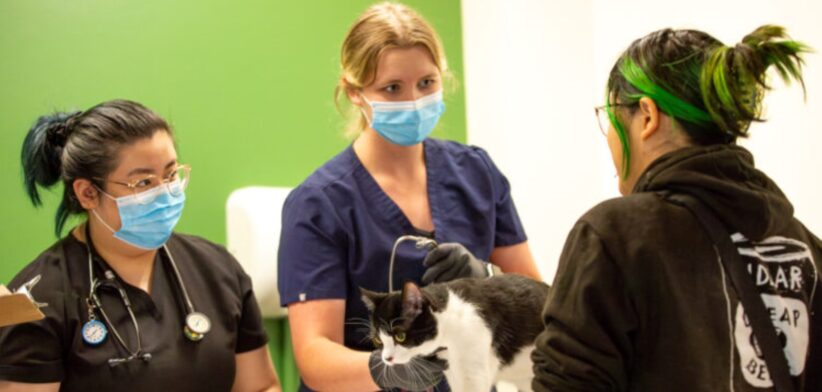An American program is integrating human medical and veterinary services in an effort to improve health care for homeless people.
The Seattle One Health Clinic, operated by the University of Washington’s Center for One Health Research and Washington State University College of Veterinary Medicine, offers free veterinary care alongside its medical services.
Postdoctoral researcher Natalie Rejto said the clinic was established based on the fact that up to a quarter of America’s 2 million homeless own a pet.
Ms Rejto said while the pets provided a crucial source of emotional support, they were also a barrier to receiving services such as housing or medical care.
“Studies have shown that unhoused people with pets were less likely to visit medical facilities and some chose veterinary care for their animals over obtaining health care for themselves,” she said.
Ms Rejto, the lead author of a research paper on the clinic, said the integrated approach increased access to preventative medical care for both people and their pets.
“It’s truly integrated — human and animal providers working together is a unique approach.”
She said at the One Health Clinic, a nurse practitioner and veterinarian, often accompanied by veterinary students, provided primary care services while students volunteered as patient navigators, helping to coordinate care and address shared health needs such as extreme weather, environmental contaminants and zoonotic disease.
“The clinic also helps clients document their pets as emotional support animals, which enables them to access a wider range of housing and other services.”
Ms Rejto said the data showed the model of care was building trust.
“It’s special to see holistic care that takes into account the environment, the animal, the person and their relationships in society, to provide care to these people. It’s incredibly important for people to have preventative care, and that in turn has a great impact on public health.”
She said her study analyzed medical and veterinary records of clinic visits between 2019 and 2022, with the majority of human participants 23 years old or younger.
“Of the 88 human clients who visited the clinic during that period, 75 saw a health care provider at least once, and 40 patients established care for the first time in at least the past two years.
“Most of those patients returned for at least one follow-up appointment within two years of their first visit.”
Ms Rejto said nearly 80 percent of all visits to the One Health Clinic resulted in clients receiving human health care.
“That includes 69 percent of visits where clients initially intended to seek care only for their pets.”
Read the full study: The One Health Clinic: Care for Young Adults and Companion Animals Experiencing Homelessness.








